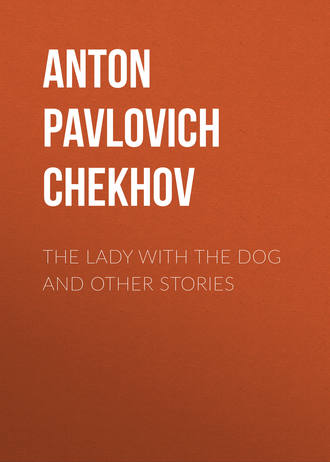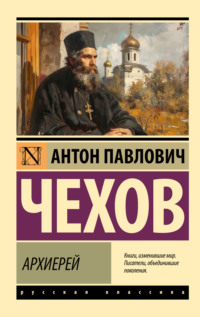 полная версия
полная версияThe Lady with the Dog and Other Stories
"I suppose it's time for me to go."
"No, stay a little… We must have a talk."
Again they were silent. He sat down to the piano, struck one chord, then began playing, and sang softly, "What does the coming day bring me?" but as usual he got up suddenly and tossed his head.
"Play something," Zinaida Fyodorovna asked him.
"What shall I play?" he asked, shrugging his shoulders. "I have forgotten everything. I've given it up long ago."
Looking at the ceiling as though trying to remember, he played two pieces of Tchaikovsky with exquisite expression, with such warmth, such insight! His face was just as usual – neither stupid nor intelligent – and it seemed to me a perfect marvel that a man whom I was accustomed to see in the midst of the most degrading, impure surroundings, was capable of such purity, of rising to a feeling so lofty, so far beyond my reach. Zinaida Fyodorovna's face glowed, and she walked about the drawing-room in emotion.
"Wait a bit, Godmother; if I can remember it, I will play you something," he said; "I heard it played on the violoncello."
Beginning timidly and picking out the notes, and then gathering confidence, he played Saint-Saëns's "Swan Song." He played it through, and then played it a second time.
"It's nice, isn't it?" he said.
Moved by the music, Zinaida Fyodorovna stood beside him and asked:
"Tell me honestly, as a friend, what do you think about me?"
"What am I to say?" he said, raising his eyebrows. "I love you and think nothing but good of you. But if you wish that I should speak generally about the question that interests you," he went on, rubbing his sleeve near the elbow and frowning, "then, my dear, you know… To follow freely the promptings of the heart does not always give good people happiness. To feel free and at the same time to be happy, it seems to me, one must not conceal from oneself that life is coarse, cruel, and merciless in its conservatism, and one must retaliate with what it deserves – that is, be as coarse and as merciless in one's striving for freedom. That's what I think."
"That's beyond me," said Zinaida Fyodorovna, with a mournful smile. "I am exhausted already. I am so exhausted that I wouldn't stir a finger for my own salvation."
"Go into a nunnery."
He said this in jest, but after he had said it, tears glistened in Zinaida Fyodorovna's eyes and then in his.
"Well," he said, "we've been sitting and sitting, and now we must go. Good-bye, dear Godmother. God give you health."
He kissed both her hands, and stroking them tenderly, said that he should certainly come to see her again in a day or two. In the hall, as he was putting on his overcoat, that was so like a child's pelisse, he fumbled long in his pockets to find a tip for me, but found nothing there.
"Good-bye, my dear fellow," he said sadly, and went away.
I shall never forget the feeling that this man left behind him.
Zinaida Fyodorovna still walked about the room in her excitement. That she was walking about and not still lying down was so much to the good. I wanted to take advantage of this mood to speak to her openly and then to go away, but I had hardly seen Gruzin out when I heard a ring. It was Kukushkin.
"Is Georgy Ivanitch at home?" he said. "Has he come back? You say no? What a pity! In that case, I'll go in and kiss your mistress's hand, and so away. Zinaida Fyodorovna, may I come in?" he cried. "I want to kiss your hand. Excuse my being so late."
He was not long in the drawing-room, not more than ten minutes, but I felt as though he were staying a long while and would never go away. I bit my lips from indignation and annoyance, and already hated Zinaida Fyodorovna. "Why does she not turn him out?" I thought indignantly, though it was evident that she was bored by his company.
When I held his fur coat for him he asked me, as a mark of special good-will, how I managed to get on without a wife.
"But I don't suppose you waste your time," he said, laughingly. "I've no doubt Polya and you are as thick as thieves… You rascal!"
In spite of my experience of life, I knew very little of mankind at that time, and it is very likely that I often exaggerated what was of little consequence and failed to observe what was important. It seemed to me it was not without motive that Kukushkin tittered and flattered me. Could it be that he was hoping that I, like a flunkey, would gossip in other kitchens and servants' quarters of his coming to see us in the evenings when Orlov was away, and staying with Zinaida Fyodorovna till late at night? And when my tittle-tattle came to the ears of his acquaintance, he would drop his eyes in confusion and shake his little finger. And would not he, I thought, looking at his little honeyed face, this very evening at cards pretend and perhaps declare that he had already won Zinaida Fyodorovna from Orlov?
That hatred which failed me at midday when the old father had come, took possession of me now. Kukushkin went away at last, and as I listened to the shuffle of his leather goloshes, I felt greatly tempted to fling after him, as a parting shot, some coarse word of abuse, but I restrained myself. And when the steps had died away on the stairs, I went back to the hall, and, hardly conscious of what I was doing, took up the roll of papers that Gruzin had left behind, and ran headlong downstairs. Without cap or overcoat, I ran down into the street. It was not cold, but big flakes of snow were falling and it was windy.
"Your Excellency!" I cried, catching up Kukushkin. "Your Excellency!"
He stopped under a lamp-post and looked round with surprise. "Your Excellency!" I said breathless, "your Excellency!"
And not able to think of anything to say, I hit him two or three times on the face with the roll of paper. Completely at a loss, and hardly wondering – I had so completely taken him by surprise – he leaned his back against the lamp-post and put up his hands to protect his face. At that moment an army doctor passed, and saw how I was beating the man, but he merely looked at us in astonishment and went on. I felt ashamed and I ran back to the house.
XII
With my head wet from the snow, and gasping for breath, I ran to my room, and immediately flung off my swallow-tails, put on a reefer jacket and an overcoat, and carried my portmanteau out into the passage; I must get away! But before going I hurriedly sat down and began writing to Orlov:
"I leave you my false passport," I began. "I beg you to keep it as a memento, you false man, you Petersburg official!
"To steal into another man's house under a false name, to watch under the mask of a flunkey this person's intimate life, to hear everything, to see everything in order later on, unasked, to accuse a man of lying – all this, you will say, is on a level with theft. Yes, but I care nothing for fine feelings now. I have endured dozens of your dinners and suppers when you said and did what you liked, and I had to hear, to look on, and be silent. I don't want to make you a present of my silence. Besides, if there is not a living soul at hand who dares to tell you the truth without flattery, let your flunkey Stepan wash your magnificent countenance for you."
I did not like this beginning, but I did not care to alter it. Besides, what did it matter?
The big windows with their dark curtains, the bed, the crumpled dress coat on the floor, and my wet footprints, looked gloomy and forbidding. And there was a peculiar stillness.
Possibly because I had run out into the street without my cap and goloshes I was in a high fever. My face burned, my legs ached… My heavy head drooped over the table, and there was that kind of division in my thought when every idea in the brain seemed dogged by its shadow.
"I am ill, weak, morally cast down," I went on; "I cannot write to you as I should like to. From the first moment I desired to insult and humiliate you, but now I do not feel that I have the right to do so. You and I have both fallen, and neither of us will ever rise up again; and even if my letter were eloquent, terrible, and passionate, it would still seem like beating on the lid of a coffin: however one knocks upon it, one will not wake up the dead! No efforts could warm your accursed cold blood, and you know that better than I do. Why write? But my mind and heart are burning, and I go on writing; for some reason I am moved as though this letter still might save you and me. I am so feverish that my thoughts are disconnected, and my pen scratches the paper without meaning; but the question I want to put to you stands before me as clear as though in letters of flame.
"Why I am prematurely weak and fallen is not hard to explain. Like Samson of old, I have taken the gates of Gaza on my shoulders to carry them to the top of the mountain, and only when I was exhausted, when youth and health were quenched in me forever, I noticed that that burden was not for my shoulders, and that I had deceived myself. I have been, moreover, in cruel and continual pain. I have endured cold, hunger, illness, and loss of liberty. Of personal happiness I know and have known nothing. I have no home; my memories are bitter, and my conscience is often in dread of them. But why have you fallen – you? What fatal, diabolical causes hindered your life from blossoming into full flower? Why, almost before beginning life, were you in such haste to cast off the image and likeness of God, and to become a cowardly beast who backs and scares others because he is afraid himself? You are afraid of life – as afraid of it as an Oriental who sits all day on a cushion smoking his hookah. Yes, you read a great deal, and a European coat fits you well, but yet with what tender, purely Oriental, pasha-like care you protect yourself from hunger, cold, physical effort, from pain and uneasiness! How early your soul has taken to its dressing-gown! What a cowardly part you have played towards real life and nature, with which every healthy and normal man struggles! How soft, how snug, how warm, how comfortable – and how bored you are! Yes, it is deathly boredom, unrelieved by one ray of light, as in solitary confinement; but you try to hide from that enemy, too, you play cards eight hours out of twenty-four.
"And your irony? Oh, but how well I understand it! Free, bold, living thought is searching and dominating; for an indolent, sluggish mind it is intolerable. That it may not disturb your peace, like thousands of your contemporaries, you made haste in youth to put it under bar and bolt. Your ironical attitude to life, or whatever you like to call it, is your armour; and your thought, fettered and frightened, dare not leap over the fence you have put round it; and when you jeer at ideas which you pretend to know all about, you are like the deserter fleeing from the field of battle, and, to stifle his shame, sneering at war and at valour. Cynicism stifles pain. In some novel of Dostoevsky's an old man tramples underfoot the portrait of his dearly loved daughter because he had been unjust to her, and you vent your foul and vulgar jeers upon the ideas of goodness and truth because you have not the strength to follow them. You are frightened of every honest and truthful hint at your degradation, and you purposely surround yourself with people who do nothing but flatter your weaknesses. And you may well, you may well dread the sight of tears!
"By the way, your attitude to women. Shamelessness has been handed down to us in our flesh and blood, and we are trained to shamelessness; but that is what we are men for – to subdue the beast in us. When you reached manhood and all ideas became known to you, you could not have failed to see the truth; you knew it, but you did not follow it; you were afraid of it, and to deceive your conscience you began loudly assuring yourself that it was not you but woman that was to blame, that she was as degraded as your attitude to her. Your cold, scabrous anecdotes, your coarse laughter, all your innumerable theories concerning the underlying reality of marriage and the definite demands made upon it, concerning the ten sous the French workman pays his woman; your everlasting attacks on female logic, lying, weakness and so on – doesn't it all look like a desire at all costs to force woman down into the mud that she may be on the same level as your attitude to her? You are a weak, unhappy, unpleasant person!"
Zinaida Fyodorovna began playing the piano in the drawing-room, trying to recall the song of Saint Saëns that Gruzin had played. I went and lay on my bed, but remembering that it was time for me to go, I got up with an effort and with a heavy, burning head went to the table again.
"But this is the question," I went on. "Why are we worn out? Why are we, at first so passionate, so bold, so noble, and so full of faith, complete bankrupts at thirty or thirty-five? Why does one waste in consumption, another put a bullet through his brains, a third seeks forgetfulness in vodka and cards, while the fourth tries to stifle his fear and misery by cynically trampling underfoot the pure image of his fair youth? Why is it that, having once fallen, we do not try to rise up again, and, losing one thing, do not seek something else? Why is it?
"The thief hanging on the Cross could bring back the joy of life and the courage of confident hope, though perhaps he had not more than an hour to live. You have long years before you, and I shall probably not die so soon as one might suppose. What if by a miracle the present turned out to be a dream, a horrible nightmare, and we should wake up renewed, pure, strong, proud of our righteousness? Sweet visions fire me, and I am almost breathless with emotion. I have a terrible longing to live. I long for our life to be holy, lofty, and majestic as the heavens above. Let us live! The sun doesn't rise twice a day, and life is not given us again – clutch at what is left of your life and save it…"
I did not write another word. I had a multitude of thoughts in my mind, but I could not connect them and get them on to paper. Without finishing the letter, I signed it with my name and rank, and went into the study. It was dark. I felt for the table and put the letter on it. I must have stumbled against the furniture in the dark and made a noise.
"Who is there?" I heard an alarmed voice in the drawing-room.
And the clock on the table softly struck one at the moment.
XIII
For at least half a minute I fumbled at the door in the dark, feeling for the handle; then I slowly opened it and walked into the drawing-room. Zinaida Fyodorovna was lying on the couch, and raising herself on her elbow, she looked towards me. Unable to bring myself to speak, I walked slowly by, and she followed me with her eyes. I stood for a little time in the dining-room and then walked by her again, and she looked at me intently and with perplexity, even with alarm. At last I stood still and said with an effort:
"He is not coming back."
She quickly got on to her feet, and looked at me without understanding.
"He is not coming back," I repeated, and my heart beat violently. "He will not come back, for he has not left Petersburg. He is staying at Pekarsky's."
She understood and believed me – I saw that from her sudden pallor, and from the way she laid her arms upon her bosom in terror and entreaty. In one instant all that had happened of late flashed through her mind; she reflected, and with pitiless clarity she saw the whole truth. But at the same time she remembered that I was a flunkey, a being of a lower order… A casual stranger, with hair ruffled, with face flushed with fever, perhaps drunk, in a common overcoat, was coarsely intruding into her intimate life, and that offended her. She said to me sternly:
"It's not your business: go away."
"Oh, believe me!" I cried impetuously, holding out my hands to her. "I am not a footman; I am as free as you."
I mentioned my name, and, speaking very rapidly that she might not interrupt me or go away, explained to her who I was and why I was living there. This new discovery struck her more than the first. Till then she had hoped that her footman had lied or made a mistake or been silly, but now after my confession she had no doubts left. From the expression of her unhappy eyes and face, which suddenly lost its softness and beauty and looked old, I saw that she was insufferably miserable, and that the conversation would lead to no good; but I went on impetuously:
"The senator and the tour of inspection were invented to deceive you. In January, just as now, he did not go away, but stayed at Pekarsky's, and I saw him every day and took part in the deception. He was weary of you, he hated your presence here, he mocked at you… If you could have heard how he and his friends here jeered at you and your love, you would not have remained here one minute! Go away from here! Go away."
"Well," she said in a shaking voice, and moved her hand over her hair. "Well, so be it."
Her eyes were full of tears, her lips were quivering, and her whole face was strikingly pale and distorted with anger. Orlov's coarse, petty lying revolted her and seemed to her contemptible, ridiculous: she smiled and I did not like that smile.
"Well," she repeated, passing her hand over her hair again, "so be it. He imagines that I shall die of humiliation, and instead of that I am … amused by it. There's no need for him to hide." She walked away from the piano and said, shrugging her shoulders: "There's no need… It would have been simpler to have it out with me instead of keeping in hiding in other people's flats. I have eyes; I saw it myself long ago… I was only waiting for him to come back to have things out once for all."
Then she sat down on a low chair by the table, and, leaning her head on the arm of the sofa, wept bitterly. In the drawing-room there was only one candle burning in the candelabra, and the chair where she was sitting was in darkness; but I saw how her head and shoulders were quivering, and how her hair, escaping from her combs, covered her neck, her face, her arms… Her quiet, steady weeping, which was not hysterical but a woman's ordinary weeping, expressed a sense of insult, of wounded pride, of injury, and of something helpless, hopeless, which one could not set right and to which one could not get used. Her tears stirred an echo in my troubled and suffering heart; I forgot my illness and everything else in the world; I walked about the drawing-room and muttered distractedly:
"Is this life?.. Oh, one can't go on living like this, one can't… Oh, it's madness, wickedness, not life."
"What humiliation!" she said through her tears. "To live together, to smile at me at the very time when I was burdensome to him, ridiculous in his eyes! Oh, how humiliating!"
She lifted up her head, and looking at me with tear-stained eyes through her hair, wet with her tears, and pushing it back as it prevented her seeing me, she asked:
"They laughed at me?"
"To these men you were laughable – you and your love and Turgenev; they said your head was full of him. And if we both die at once in despair, that will amuse them, too; they will make a funny anecdote of it and tell it at your requiem service. But why talk of them?" I said impatiently. "We must get away from here – I cannot stay here one minute longer."
She began crying again, while I walked to the piano and sat down.
"What are we waiting for?" I asked dejectedly. "It's two o'clock."
"I am not waiting for anything," she said. "I am utterly lost."
"Why do you talk like that? We had better consider together what we are to do. Neither you nor I can stay here. Where do you intend to go?"
Suddenly there was a ring at the bell. My heart stood still. Could it be Orlov, to whom perhaps Kukushkin had complained of me? How should we meet? I went to open the door. It was Polya. She came in shaking the snow off her pelisse, and went into her room without saying a word to me. When I went back to the drawing-room, Zinaida Fyodorovna, pale as death, was standing in the middle of the room, looking towards me with big eyes.
"Who was it?" she asked softly.
"Polya," I answered.
She passed her hand over her hair and closed her eyes wearily.
"I will go away at once," she said. "Will you be kind and take me to the Petersburg Side? What time is it now?"
"A quarter to three."
XIV
When, a little afterwards, we went out of the house, it was dark and deserted in the street. Wet snow was falling and a damp wind lashed in one's face. I remember it was the beginning of March; a thaw had set in, and for some days past the cabmen had been driving on wheels. Under the impression of the back stairs, of the cold, of the midnight darkness, and the porter in his sheepskin who had questioned us before letting us out of the gate, Zinaida Fyodorovna was utterly cast down and dispirited. When we got into the cab and the hood was put up, trembling all over, she began hurriedly saying how grateful she was to me.
"I do not doubt your good-will, but I am ashamed that you should be troubled," she muttered. "Oh, I understand, I understand… When Gruzin was here to-day, I felt that he was lying and concealing something. Well, so be it. But I am ashamed, anyway, that you should be troubled."
She still had her doubts. To dispel them finally, I asked the cabman to drive through Sergievsky Street; stopping him at Pekarsky's door, I got out of the cab and rang. When the porter came to the door, I asked aloud, that Zinaida Fyodorovna might hear, whether Georgy Ivanitch was at home.
"Yes," was the answer, "he came in half an hour ago. He must be in bed by now. What do you want?"
Zinaida Fyodorovna could not refrain from putting her head out.
"Has Georgy Ivanitch been staying here long?" she asked.
"Going on for three weeks."
"And he's not been away?"
"No," answered the porter, looking at me with surprise.
"Tell him, early to-morrow," I said, "that his sister has arrived from Warsaw. Good-bye."
Then we drove on. The cab had no apron, the snow fell on us in big flakes, and the wind, especially on the Neva, pierced us through and through. I began to feel as though we had been driving for a long time, that for ages we had been suffering, and that for ages I had been listening to Zinaida Fyodorovna's shuddering breath. In semi-delirium, as though half asleep, I looked back upon my strange, incoherent life, and for some reason recalled a melodrama, "The Parisian Beggars," which I had seen once or twice in my childhood. And when to shake off that semi-delirium I peeped out from the hood and saw the dawn, all the images of the past, all my misty thoughts, for some reason, blended in me into one distinct, overpowering thought: everything was irrevocably over for Zinaida Fyodorovna and for me. This was as certain a conviction as though the cold blue sky contained a prophecy, but a minute later I was already thinking of something else and believed differently.
"What am I now?" said Zinaida Fyodorovna, in a voice husky with the cold and the damp. "Where am I to go? What am I to do? Gruzin told me to go into a nunnery. Oh, I would! I would change my dress, my face, my name, my thoughts … everything – everything, and would hide myself for ever. But they will not take me into a nunnery. I am with child."
"We will go abroad together to-morrow," I said.
"That's impossible. My husband won't give me a passport."
"I will take you without a passport."
The cabman stopped at a wooden house of two storeys, painted a dark colour. I rang. Taking from me her small light basket – the only luggage we had brought with us – Zinaida Fyodorovna gave a wry smile and said:
"These are my bijoux."
But she was so weak that she could not carry these bijoux.
It was a long while before the door was opened. After the third or fourth ring a light gleamed in the windows, and there was a sound of steps, coughing and whispering; at last the key grated in the lock, and a stout peasant woman with a frightened red face appeared at the door. Some distance behind her stood a thin little old woman with short grey hair, carrying a candle in her hand. Zinaida Fyodorovna ran into the passage and flung her arms round the old woman's neck.
"Nina, I've been deceived," she sobbed loudly. "I've been coarsely, foully deceived! Nina, Nina!"
I handed the basket to the peasant woman. The door was closed, but still I heard her sobs and the cry "Nina!"









